Car Batteries on the other hand are designed to supply the necessary short bursts of high energy to start the car. Hence, they are also known as Starter Batteries. Once the car is started, the car’s alternator will kick-in and produces the required power. An important difference between Deep Cycle Batteries and regular Car Batteries is that deep cycle batteries can be discharge up to 80% of its capacity (although it is not recommended to discharge a battery below 50%), whereas the car battery must be almost fully charged at all times i.e., they can be discharged only to a small % of their capacity (usually, 2% to 5%) before they are recharged. So, where are Deep Cycle Batteries used? They are used in applications where it is necessary for the battery to be able to deliver sustained / stable power over an extended duration. The first application that comes to mind is the UPS or Uninterruptable Power Supply. Some of the other applications of Deep Cycle Batteries are:
Golf Carts RVs Boats (and other Marine applications) Wheel Chairs Electric Vehicles (EVs) Emergency Lighting Medical Devices Industrial Fork Lifts and Floor Sweepers Off-grid Energy Storage (Solar, Wind) Uninterruptable Power Supply (UPS)
There is a right deep cycle battery for every need. If you are in the market for a Deep Cycle Battery, then you have to be aware of some important specs of the battery in order to analyze the battery before making a purchase. Below are the three main considerations to check out…
Type: There are two types of deep cycle batteries – Lithium-Ion and Lead Acid (Flooded, AGM and Gel). Of these two, the lead-acid type dominates the market while the Lithium-Ion batteries are slowly becoming popular. Capacity: This capacity rating is given in Ah (Amp Hour). Simply speaking, the ‘Ah’ rating of a battery specifies the amount of current a battery can supply for a certain duration. Discharge Cycle: It represents how many times the battery can be discharged and recharged. It is better to go for a model with higher discharge / charge cycles for long life.
There are several other factors as well to consider – that are clearly mentioned in the “Buying Guide”. Using the same information, we tested and analysed several products. After that, we have shortlisted the Best Deep Cycle Batteries based on the results.
10 Best Deep Cycle Battery In 2023
10 Best Deep Cycle Batteries In 2023 Reviews
1. Battle Born LiFePO4 Deep Cycle Battery
Best Pure Sine Wave Inverters Best Rechargeable Batteries Best Truck power Inverters Best Golf cart Battery Deep cycle battery maintenance Best Truck Battery
Check Price On Walmart Based in Reno, Nevada, Battle Born is known for making sustainable green energy batteries. All their batteries are made using Lithium Iron Phosphate (LiFePO4), which are known for their reliability and stability. The Battle Born 12V 100 Amp Hour LiFePO4 Battery offers 2 to 3 times the power compared to a similar size Lead-Acid Battery. At just 31 lbs., this Battle Born battery weighs only 1/3rd of an equivalent lead-acid battery and also lasts 10 times longer. Besides, the batteries use 100% safe and renewable energy in the manufacturing. In a way, you will be contributing to sustainable-energy growth by using these green energy batteries. A problem with Lithium-Ion batteries in general is different charge levels of individual cells. Thanks to the built-in Battery management System (BMS), these batteries have automatic cell balancing and are protected from common battery failures (ground faults, temperature faults and other faults) with low / high voltage protection, low / high temperature protection, short circuit and cold charge protection. The BMS is also capable of 100 A continuous current, 200 A of surge current for 30s or ½ second of surge current for over 200 A loads. Coming to discharge / charge cycles, the Battle Born 12V 100 Amp Hour LiFePO4 Batteries have 3000 to 5000 cycles and can be discharged up to 90% of the capacity (where the voltage drops down to just below 12V). Even after the 3000 – 5000 cycles (assuming 80% to 90% discharge), these batteries retain about 70% to 80% of the capacity. The advantage of Battle Born LiFePO4 batteries is that they can be charged faster (up to 5 times faster) than standard lead acid batteries. Even though these batteries are readily suitable for all 12V applications, they can used in 24V, 36V or 48V systems by properly connecting them in series. They can be used in RVs, boats, Solar energy storage, etc. Battle Born has backed this deep cycle battery with a long 10-year warranty period. You can contact the brand if any issue arises and it will replace the product. Pros:
More discharge cycles with up to 5,000 counts. Claimed Depth of Discharge 100% (recommended up to 90%). Lightweight with only 31 lbs. Made from 100% safe, non-toxic and renewable energy. 10-year replacement warranty
Cons:
Battery capacity is low (only 100 Ah, but higher capacities are available). BMS can be tricky if the battery is discharged down to 10V.
2. Chins LiFePO4 Deep Cycle Battery
Chins is a relatively small Chinese brand but makes reliable and powerful deep cycle batteries that are safe to use. This Chins 12V LiFePO4 Deep Cycle Battery has a high capacity of 300 Ah. The life of this deep cycle battery is 8-10 times longer than an equivalent lead-acid battery. One of the best things about this battery is that it has a depth of discharge of 100%. What this means is that you can keep using the battery until it drains completely without any problem. Once it discharges completely, you can recharge it with a standard charge current of 50A (which will take 7 hours to fully recharge). The maximum continuous charge current is 100A (not recommended). Coming to the discharge, this battery has an impressive 2000 – 5000 discharge / charge cycles at a maximum discharge of 80%. The maximum continuous discharge current is 200A while the peak discharge current is 400A for less than 5 seconds. The Chins 12V 300Ah LiFePO4 Deep Cycle Battery supports up to 2560W of power output. Hence, it is ideal for RVs (or Caravans), storage for off-grid Solar Power Systems, Marine, CCTV Security Systems, EVs (Cars, Golf Carts) and many more. The brand offers a 90-day return policy. If any issue arises, you can return the product for a full refund. On top of this, you also get a 3-year replacement warranty and a 10-year service warranty. Pros:
High capacity of 300Ah Discharge depth of 100% Lower cost per Ah. High discharge cycle of up to 5000 counts Lightweight Eco Friendly and does not contain hazardous substances 3-year replacement and 10-year service warranty
Cons:
BMS in some units doesn’t work for low / high voltage protection.
3. Ampere Time LiFePO4 Deep Cycle Battery
Check Price On dhgate The Shenzhen Ampere Time technology has been in the field of manufacturing LiFePO4 batteries for more than 12 years. Ampere Time’s 12V 300Ah LiFePO4 Deep Cycle Battery serves as a very versatile solution for motor homes, campers and solar homes. It has a 100% depth of discharge. So, you can use the battery until it drains completely, without any loss in output power. After the battery is drained completely, you have to recharge the battery with a maximum continuous charging current of 200A (although this is not recommended). You also get a discharge cycle count of over 4000 cycles. After this, you will experience a drop in the capacity but the power will still be sufficient for your needs. With a maximum discharge current of 200A (and up to 5 second discharge of 400A peak current), you can easily use it for loads up to 2560W. One thing that Ampere Time has really focused on is the safety aspects of the battery. These batteries are made from automotive-grade LiFePO4 cells. Each cell in the battery has a UL Testing Certificate. Besides, it also comes with IP65 level waterproof features. Also, it only weighs 69 lbs., one-third of the weight of relative lead-acid batteries. This makes the battery perfect for outdoor usage. Ampere Time LiFePO4 deep cycle battery comes with an extended 10-year service warranty. If there is an issue, the brand will troubleshoot the battery free of cost. Pros:
High capacity of 300Ah High discharge cycle of 4000 counts (up to 6000 cycles with reduced capacity) IP65 Waterproof feature (Ideal for outdoor use) 10-year service warranty
Cons:
Questionable BMS for Low temperature cut-off protection.
4. Universal Power Group Deep Cycle Battery
Check Price On Walmart Next on our list is Universal Power Group’s deep cycle battery. Universal Power Group is a popular manufacturer of a wide range of batteries that are used for diverse applications. This deep cycle battery comes with a capacity of 100Ah. Although this capacity is not very high, this would be sufficient to power up your mini trailers, golf carts, and campers. The battery is lightweight with only 63.93 lbs and measures 0.48 x 0.26 x 0.33 inches. This compact and lightweight nature of the battery allows you to carry it easily and install it anywhere you want. The battery has a spill-proof that allows you to mount it any position without the worry of any leakage or spillage. Besides, the battery is also resistant to shocks and vibrations. These features make it ideal to be used for golf carts, mini-boats, mini-trailers, or other moving vehicles where there would be a lot of disturbance and vibrations. Universal Power Group’s deep cycle battery comes with an SLA/AGM maintenance feature. There is practically no maintenance involved and you can use this battery until it completely drains out. On top of all these features, the battery is backed by a 1-year warranty from the date of purchase. Pros
Suitable for small power demands Spill-proof and leakage proof Resistant against shocks and vibrations Easy to mount Zero maintenance
Cons
Low capacity Only a 1-year warranty
5. ExpertPower Rechargeable Deep Cycle Batteries
ExpertPower is a reliable brand when it comes to batteries, generators, chargers and solar kits. Their 12V deep cycle batteries comes with capacity of 33Ah which is sufficient for small applications. However, it may not be an ideal choice for your golf carts, trailers, boats and RVs. When it comes to the safety aspects of the battery, you can have a sigh of relief. The battery does not release any harmful fumes nor leak. And moreover, it comes with different safety and quality certifications. The battery is lightweight and only weighs 10.8 Kgs., which is only half the weight of its lead-acid counterpart. However, the capacity will be twice than that. These batteries come along with valve regulated and spill-proof construction which makes them hassle-free. It is made up of non-conductive ABS plastic material which ensures resistance from shock, heat, chemical and vibration. Pros
Rugged batteries construction Tough exterior High-impact resistance Spill-proof design Absorbed glass mat technology Easy installation
Cons
Capacity is small
6. Weize LFP1200 Deep Cycle Battery
Check Price On eBay Weize is another small brand but nevertheless, the performance of its deep cycle batteries is right there along with other big brands. The TL12100 or LFP1200 is another budget-friendly 12v Deep cycle battery that has 100Ah capacity. While this capacity is ideal for electric vehicles, RVs, and Mini Kota, you cannot use this for large trailers. The power might not be enough to meet the demands. The battery comes with a deep discharge-recover. So, you can use the battery until it gets completely drained. After that, you have to recharge the battery for a few hours before using it again. The battery is of lead-acid type. So, you have to be a bit careful when using it. But the battery comes with AGM (Absorbent Glass Mat) technology that has a valve-regulated design. You don’t have to worry about any leakage issues. The LFP12100 comes with a standard 30-day refund policy and 1-year warranty period. Pros:
Decent capacity for its price range High discharge depth AGM technology and valve regulated design for preventing leakage Suitable for electric vehicles, RVs and Mini Kota Affordable
Cons:
Only 1-year warranty Contains lead that is toxic
7. Optima OPT8016-103 Marine Deep Cycle Battery
Check Price On Batteriesplus Optima is one of the most prominent battery brands in the U.S. The brand provides three line of batteries: RedTop, BlueTop and YellowTop. Each one is designed for different purposes. The Optima OPT8016-103 BlueTop (with light gray case) is a combination of starter battery and a deep cycle battery which is specifically designed to be used in boats, RVs, golf carts and marine Applications. However, it only has a capacity of 55Ah, which is on the lower side in our list. So, you cannot use it in large trailers or any other purposes where the power demands are high. With the OPT8016-103 deep cycle battery, you get a reserve capacity of 120 minutes. While it may not seem significant, it will come in handy in emergency situations. One more important thing is that you can recharge this battery up to three times faster than other batteries. The battery is spill-proof. So, you do not have to be concerned about leakage and you can install the battery at any position. On top of this, it has 15 times more resistance against vibrations. Now, you know why this is a great battery to be used for boats. Optima provides a 36-month replacement warranty to all its batteries including this one. You can contact the brand and replace the battery if any issue pops up. Pros:
Reserve capacity of 120 minutes 15x more vibration resistance Can be installed at any position Spill-proof and maintenance-free 3-year replacement warranty Very Affordable
Cons:
Low capacity Loses efficiency over time
8. VMaxTanks V35-857 Marine Deep Cycle Battery
Check Price On Walmart VMaxTanks is a supplier of household batteries, power accessories, chargers, solar power kits, wind power kits, and supporting accessories. You will get deep cycle batteries at every price range. In this list, we have yet another deep cycle battery that is ideal to be used for small boats and RVs. With a capacity of 35Ah, the deep cycle battery can power your boat for up to 9 hours (actually, between 4 hours to 9 hours, depending on usage). The battery comes with a discharge depth of 50% to 60%. Once you drain up to 60% of the battery, it will start losing its power. You won’t get the same power you got initially. So, the battery is not ideal to power large boats or other high-power demanding operations. As the battery uses the AGM technology, it has great resistance against shocks and vibrations. Besides, there won’t be any issues of leakage or spillage. The best thing about this battery is that it is maintenance-free. You do not have to check the specific gravity of the electrolyte or add water to it. Even if you wanted to, you won’t be able to do it. A tough tank seals the seals and protects the battery to add an extra layer of safety measure. VMaxTanks provides a 12-month replacement warranty. They will replace the battery if any issue occurs. Pros:
AGM technology for shock and vibration resistance Maintenance-free Spill-proof and leak-proof Most suitable for boats 5-year limited warranty
Cons:
Low capacity Discharge depth of 50-60% Only a 12-month replacement warranty
9. XS Power D3400 Deep Cycle Battery
Check Price On Walmart Established in 2005, XS Power is a reliable battery manufacturing brand that creates batteries prominently for automotive industry. Apart from this, it also manufactures electronics including cell phone chargers and power adapters. This is another affordable option that you can use for small power needs. The XS Power D3400 is a 12V battery with a capacity of 65 Ah. So, it is understandable that it will not be suitable for large trailers. The battery is very easy to install. One of the best things about this battery is that you can mount it in any position. This is because of its spill-proof feature. The D3400 deep cycle battery has the AGM technology that ensures there is no leakage or spillage from the battery (as it is a Valve-Regulated or Sealed Battery). Besides, the battery has a high resistance against vibration. These features make the battery ideal to be used in small boats, golf carts, and electric scooters. Even if there is vibration or the battery shakes, you do not have to worry about leaks. Also, it is maintenance-free. The battery is sealed and there is no provision to open it. You do not have to add distilled water or change the electrolyte. XS Power backs this battery with a 3-year warranty. Besides, you also get a 60-day returns policy with this product. Pros:
AGM technology with a valve regulated design Spill-proof and leak-proof High resistance against vibration Suitable for small boats and golf carts Maintenance-free Comes with a 3-year warranty
Cons:
Low capacity Not suitable for high power demanding purposes Contains lead that is toxic
10. Renogy Hybrid Deep Cycle Battery
Check Price On eBay Renogy is a big brand when it comes to batteries and inverters. The brand has a huge product portfolio including batteries, solar panels, inverters, generators, and other supporting accessories. The 100Ah 12V deep cycle battery has a design life of over 12 years. During this time, you will only be able to charge the battery a little more than 750 times. Renogy has used a Hybrid Gel to hold the electrolyte that helps in preventing any electrolyte leakage or maintenance. Due to the usage of pure materials, the self-discharge is less than 3% when stored at 77oF (25oC). The combination of proprietary Lead Plate composition and patented Hybrid Gel Electrolyte allows Renogy batteries to easily recover even after a deep discharge. The battery is made of corrosion resistance grids that increase the lifetime of the product. Besides, it has valve-regulated technology. So, you do not have to worry about spillage and leakage issues. Designed to be used with Solar Power setup, these batteries can also be used in RVs, Boats, Emergency Power Systems, Emergency Lighting, Security Systems, Medical Equipment and many more. Renogy has backed this deep cycle battery with a 3-year warranty period. Please note the warranty will not be valid if you did not properly install the battery. Pros:
Good capacity for its price Spill-proof and leakage proof 3-year warranty
Cons:
Low discharge cycle of 750 counts Recommended depth of discharge is only 50%
Buying Guide For The Best Deep Cycle Batteries
With so many Deep Cycle Batteries available in the market, it often becomes overwhelming to make a choice. To help you out, we have provided a detailed analysis of several factors that are essential while considering / analyzing a deep cycle battery. Read the below information thoroughly and make an informed decision.
Types Of Deep-Cycle Batteries
At the basic level, we can classify the deep-cycle batteries into two types. They are:
Lead Acid Batteries Lithium-Ion Batteries
Lead Acid Batteries are the dominating entities either in Automotive Starter Batteries or Deep Cycle Batteries. The lead-acid battery technology is proven to be reliable, consistent and cost effective. The lead-acid batteries can be further divided in to two types:
Flooded Lead-Acid Batteries Sealed Lead-Acid Batteries (or Valve Regulated Lead-Acid Batteries)
Further, the Sealed Lead-Acid Batteries are divided into:
Absorbent Glass Mat (AGM) Batteries Gel Batteries
For easy understanding, let us divide the Deep Cycle Batteries into four types (three are of Lead-Acid type and one Lithium-Ion type).
Flooded Lead-Acid Absorbed Glass Mat (AGM) Gel Lithium-Ion
Let us get into the construction, performance, durability and other detail of each category.
1. Flooded Lead Acid
The flooded lead-acid battery is one of the most popular and dominating battery types, whether in Automotive (as starter batteries) or storage (as deep cycle batteries). The term ‘flooded’ means the lead plate are submerged in electrolyte fluid (usually, Sulfuric Acid). During charging, some water is decomposed from the electrolyte. Hence, you must perform regular inspection / maintenance for level of electrolyte and if it is below the desired level, you can top-up with distilled water. The charging of lead-acid batteries usually takes place in stages, and hence it may lead to overcharging or undercharging, sometimes. When it comes to the cost, they are the least expensive. The other downside to these batteries is that you must place them only in the upright position because there are chances that the battery’s electrolyte may spill. Moreover, it needs proper ventilation as the battery releases explosive gasses when it is getting charged. Below are the advantages and disadvantages of a Flooded Lead Acid battery: Flooded Lead Acid Pros:
Inexpensive The best option when it comes to reliability and working capabilities Can withstand overcharging Delivers good performance at both low and high temperatures The most sold battery worldwide and hence, they are easily available Has the lowest self-discharge rate amongst all other rechargeable batteries Capable of high discharge rates Highly durable
Flooded Lead Acid Battery Cons:
Require little maintenance (adding distilled water) If left discharged for too long, there is a problem of sulfation Not environmental-friendly (contains toxic Lead) Heavier when compared to other alternatives Charges slowly i.e., a fully saturated charge may take up to 14 to 16 hours It has a limited life cycle Repeated discharge cycle reduces the battery life You cannot store it in a discharged state Releases gasses (Hydrogen) if overcharged It has transportation restrictions
2. Absorbed Glass Mat (AGM) Batteries
Considered as Sealed Lead-Acid batteries, an AGM (Absorbed Glass Mat) battery contains a special fiberglass mat that contains the electrolyte solution between the battery plates. In AGM Batteries, the electrolyte is in a dry state (in contrast to flooded battery, which has wet electrolyte). While the battery works, the electrolyte moves from the glass mat to the battery plates as required. This mat contains sufficient electrolytes that are adequate for the cell to deliver its full capacity. Unlike flooded lead-acid batteries, you don’t need to add distilled water to it. Hence, it doesn’t require any maintenance. The batteries have better vibration and shock resistance in comparison with wet or gel batteries. They have a faster recharge rate than a lead-acid battery. However, they are not as fast or efficient as lithium-ion batteries. Below are the advantages and disadvantages of AGM (Absorbed Glass Mat) AGM Battery Pros:
They have very low internal resistance They are capable of delivering high currents when the load demands They are maintenance-free Lighter than a flooded lead-acid battery It charges five times faster than the lead-acid or gel battery It offers a depth-of-discharge of 80% They have a longer lifespan You can store them for an extended period without needing a recharge It does not spill It can withstand low temperatures Has low self-discharge
AGM Battery Cons:
It is considerably more expensive than lead-acid Gradual decline in capacity Overcharging the battery can shorten its life and may even ruin it You should always store it in a charged condition They have low specific energy
Learn more about: How do i Know if my battery is AGM?
3. Gel Batteries
A Gel battery is yet another type of valve-regulated lead-acid battery. In this battery, a special type of gel made from Silica is use to hold the electrolyte. As a result, the overall electrolyte becomes a semi-solid gel like quantity, making it spill-proof and maintenance free. Gel batteries do not emit any gasses like flooded lead-acid does and hence do not require any ventilation. Below are the advantages and disadvantages of Gel Batteries. Gel Battery Pros:
It is spill-proof It does not require maintenance It can withstand extreme weather conditions and has great tolerance for heat Offers high and stable performance until the end Has a longer shelf life It has low self-discharge Vibration resistant Robust and versatile Has a longer lifespan Has better cycle performance
Gel Battery Cons:
Has more upfront cost than flooded lead-acid or AGM battery It is sensitive to overcharging It requires special chargers and regulators
4. Lithium-Ion
These are the newest addition in the battery types. While there are several types of Lithium-Ion Batteries for different applications, the Lithium Iron Phosphate (LiFePO4) type are frequently used in deep cycle type lithium-ion batteries. These batteries have a cathode made up of Lithium Iron Phosphate and anode made up of graphite carbon. A special solution of lithium salts acts as electrolyte. The upside to these batteries is that you can discharge them completely without doing any damage. Also, you can recharge them quickly as their recharge rate is the fastest than other battery types. Moreover, they have a longer lifespan and can sustain any weather conditions. Lithium batteries are light in weight, almost half that of a lead-acid battery. And the best part is that you can install them in any position with zero chances of spilling. The only drawback with these batteries is their price. They are expensive than other types of batteries and are available in limited quantities. Below are the advantages and disadvantages of a Lithium-ion battery: Lithium-Ion Battery Pros:
Their usable capacity is 80% to 100% They have a high charge rate It does not have memory effect Do not require maintenance They are lightweight and compact batteries 2,000 to 5,000 charge cycles
Lithium-Ion Battery Cons:
They are very expensive when compared to other battery types You cannot charge them at low temperatures (According to a whitepaper released by Battle Born Batteries, they still perform better even at low temperatures) A Battery Management System is required (BMS is internally equipped in Deep Cycle type)
What Should You Consider When Choosing A Deep Cycle Battery?
Since you are aware of the different types of batteries, let us now look at some essential factors for choosing the best deep cycle batteries. We will discuss the pre-requisites that you should consider. Make sure you take these into account before making a purchase.
1. Hours of Use / Amp Hours
The key parameter that should come first in your checklist is the battery capacity. It is essential to know how long the battery will last before you need to recharge it again. The measure for battery capacity is ampere-hours or Ah. Theoretically speaking, the Amp Hour of a battery determines how many amps of current a battery can deliver over a duration of 60 minutes. For example, a 10 Ah battery can deliver 10 Amps of continuous current for one hour. Of course, this is just a theoretical explanation and practically speaking, there are other factors like temperature, hour rate, operating conditions, type of load and end voltage that determine the capacity of the battery. You can calculate the capacity using this simple formula: Capacity (Ah) = Device Wattage (W) x Time to Run (Hours) / Battery Voltage (V) If you simultaneously want to use more appliances, then you need more capacity.
2. Size and Weight
The next prominent factor to consider when choosing a battery is the size and weight. The smaller the size of the battery, the easier it is to carry. Moreover, if they are lightweight, they do not add weight to your vehicle and you can carry them easily. In this case, many people choose the lithium-ion battery models, which have high energy density and light in weight.
3. Volt Rating
Volt rating shows the left battery power for use. If you want to use the battery for bigger tasks, we recommend choosing the one with a higher volt rating.
4. Charge Time
This is the amount of time that the battery will take to recharge after use. If the charge time is lower, it means you can use the battery quickly. Refer to the user manual if you want to know the charging time of your battery.
5. Depth of Discharge
The depth of discharge (DoD) is another essential factor for consideration. It is basically the total amount of energy discharged from the battery, also expressed as the percentage of the total power capacity of the battery. The more often you discharge and charge the battery, greater are the chances of reducing its overall service life. It is suggestible not to discharge your battery completely and only use the maximum recommended DOD as specified by the manufacturer.
6. Discharge Cycle
The discharge cycle determines how many times you can discharge / charge your battery without any reduction in its capacity or performance. Check for these paraments as well before purchasing.
7. Durability
The durability of the product is something that we all pay keen attention to. We all look for devices that long last and that do not need a replacement soon. No matter what type of batter you want to choose, make sure it is highly durable. Repeated charges and discharges should not affect the life cycle of the battery. Moreover, your battery should be capable of delivering greater performance for high-demand applications like marine, aircraft, and solar energy systems. Many batteries are susceptible to different factors like temperature, shock, vibrations, etc. Ensure your battery can withstand all the above without compromising its performance and lifespan.
8. Functionality
There are batteries with greater and sophisticated functionality called dual-purpose batteries or hybrid batteries. You can use such models as starter batteries (for starting an engine) as well as for deep cycle usage in UPS, Solar, EVs. Make sure to check for the CCA rating that ensures adequate starting power.
9. Shelf Life
The shelf life of the battery is another deciding factor for choosing the right deep cycle battery. Battery shelf life or battery aging is primarily dependent on three influential factors namely, the chemicals in the cell, its idle time, and the storage temperature. We all know that many batteries come with high self-discharge rates. In other words, if the self-discharge rate of your battery is high, the sooner it loses its power when being idle. It becomes a significant concern for all deep cycle batteries as they cannot hold a charge between the usage. It is a growing concern, especially in extreme weather conditions, where high temperatures intensify the self-discharge rate, making it inevitable to all batteries. The ideal shelf life offered by best deep cycle batteries is around ten years before they start losing the maximum capacity. The not-so-famous or worst batteries guarantee a shelf life of about a year or two.
10. Compatibility
Compatibility is something that you don’t want to compromise with. The battery you choose should be compatible with your vehicle, hence do not forget to check for it. Also, ensure that the Amp hour of the battery are not too high / low, but suitable for your vehicle. Remember that a battery with high Ah takes more time to charge.
11. Brand
Looking for a brand is always preferable if you want to purchase the right deep cycle battery. Many nameless batteries are available in the market, claiming to offer everything you need. Do not fall prey to these false claims, as they do not hold any quality. Always look for famous brands that earned recognition for the quality, ensuring high performance.
12. Charging the Battery
The next parameter in the list to consider is the way you charge the battery. You can either use a generator, solar power, or shore power to charge. You may even use a combination of the three. If, in case, you do not have any, using a smart charger or charge controller would do the needful. Make sure you are using the correct charging profile suitable for your battery type when using the above method. This will enable an uninterrupted charge supply to your battery. The controller acts as a guard for your battery by helping you adjust the voltage and current automatically.
13. Power at Low and High Temperatures
The battery you choose should withstand extreme weather conditions. It should be capable of providing power at both low and high temperatures. Whether you live in cold regions or areas with humidity and high temperature, lookout for a battery that is compatible with use. If you are living in a hot area, then your battery should sustain a temperature of at least 35 degrees.
14. Ability to Withstand Vibrations
The best deep cycle battery should have resistance to vibrations and shocks. A batter with a solid and sturdy construction can easily withstand shocks and vibrations. If in any case, your battery is not shock and vibration-resistant, you will have to spend huge on the expenses incurred for repairs and damages.
15. Warranty
The last and also the most crucial parameter to consider when buying a deep cycle battery is the warranty. While standard batteries do not guarantee long life, these cells last a long time and also offer a high discharge cycle. Always check for the warranty of your deep cycle battery before you decide on buying one. Most batteries come with a warranty of one year. However, some offer a warranty of 10 years or even more, making it the most reliable.
16. Maintenance Tips
Here are some tips for maintaining your deep cycle batteries. Follow these diligently to keep them running long-term and extend their life:
Clean the top of the batteries and make sure it is free from dust and dirt. Also, clean the terminals and cables to avoid corrosion build-up. Charge the batteries as required. Ensure you charge it fully when not in use. If your battery is charging slowly or not charging even after hours of plugging it in, we recommend you check for any bulges or cracks on it. If you find any, it means they are likely defective or damaged. During winters, ensure that your battery receives a trickle charge to stay fully charged. Immediately replace the batteries that cannot handle deep discharge. Replacing one chemical battery for another will deter battery life. Never mix an old battery with a new one, as it will reduce the device’s performance and may even damage it. Store batteries in a secured box that is acid-proof to prevent the effects of vibration and shock. Exposure to vibrations decreases the lifespan of the batteries. Monitor the fluid levels (electrolyte) in wet cell batteries and refill them if required. Lubricate your corrosion-resistant batteries to boost their shelf life.
How To Get The Best Performance From Deep Cycle Batteries?
If you want to achieve optimum performance from your deep cycle batteries, you need to follow proper care and maintenance. Here are some useful tips to maximize the durability of your battery:
1. Monitor the Charge Levels of Your Battery
Always monitor the charge levels of your deep cycle battery. Start charging them when you see any indication of a 50% charge. But make sure you do not let it go below 20%. You can use simple tools like digital multimeters to measure battery charge levels.
2. Prevent Sulfation
Prevent the sulfation build-up on the batteries by keeping them charged from time-to-time. Charge your battery even when not in use.
3. Let the Battery Rest
Allow the battery to rest for some time after continuous usage and recharge. Let it cool down before you start using it again. Using the battery immediately after recharging can lead to formation grid corrosion, which may further destroy the battery. Ans: Based on the performance, voltage, current, and capacity, Battle Born Batteries, Universal Power Group, and Optima are the best deep cycle batteries. 2. How long will a 100Ah deep cycle battery last? Ans: Theoretically, if the load is drawing 10A of current from a 100Ah deep cycle battery, then it can last about 10 hours. But practically, this is not possible due to several factors. 3. How long will Deep Cycle Battery last? Ans: With proper care and maintenance, most deep cycle batteries will last up to six years. While lithium batteries may last for about 3 to 10 years, Lead-acid batteries and AGM batteries will last six years each. Gel batteries, on the other hand, can last up to 10 years. 4. What is the Charging Time required for Deep Cycle Batteries? Ans: The charging time required for batteries varies from type to type.
Lithium batteries usually take around two to three hours for charging. Lead-acid batteries require 8 to 16 hours for charging. Gel batteries need about 5 to 10 hours to charge. And finally, AGM batteries require a charging time of five hours.
NOTE: These are typical values and the actual timings depends on several factors like capacity of battery, age of battery, type of charger, charging current etc. 5. Can I connect different batteries together? Ans: No, you should not connect different batteries together. You can only connect batteries that are of the same type, model and have the same capacity and age. Moreover, they should have an identical size wiring connected to the charging source at the same location.However, you can connect the starter battery of your camper van engine to the house battery bank using a battery combiner or charging relay. This way, you can charge the house bank through the alternator. 6. How many Batteries do I need for my trailer? Ans: The number of batteries you need for your trailer is entirely dependent on its size and power requirements. If it is a small trailer, it requires two batteries, at least, to power your systems. Whereas, a big trailer might need up to six or seven batteries. You could also daisy chain the required batteries to form a series or a larger battery. This facilitates in delivering more effective and reliable power 7. Is it ok to use a Deep Cycle Battery in my car? Ans: It is not a good idea to use a deep cycle battery in your car as a starter battery. Deep Cycle Batteries are not designed to deliver the high current required during start-up. You can easily damage the battery and in the worst case, you might damage the car. Hence, it is always advisable to use only use car batteries (which are called Starter Batteries or SLI Batteries) in your car. 8. Lithium Iron Phosphate Vs. Lithium Cobalt Oxide Batteries: Which one is best? Ans: Lithium batteries undoubtedly have the highest energy density when compared to other batteries. Amongst them, the lithium iron phosphate battery is the safest and the long-lived type. Although it has a comparatively lower energy density than lithium cobalt oxide batteries, it is less prone to thermal runaway. Not only that, but it also has a very flat discharge curve and the longest life than any of the lithium chemistries. However, you should have proper maintenance by following good charging practices and moderate temperature conditions 9. Can You Overcharge a Deep Cycle Battery? Ans: A. Yes, you can overcharge a deep cycle battery. However, overcharging reduces the lifespan of the battery and also its overall capacity. If you want to prolong the life cycle of the battery, you better avoid doing that.Get the right charger if you want to avoid overcharging your battery. Usually, you can charge most AGM batteries to a level of 2.4 volts per cell. You can lower it based on the charger you use. If it is a float charger, lower the level to 2.25 volts per cell. In case, if it is hot outside, further lower charging voltage, as high temperature allows fast charging of the batteries.
Conclusion
Unlike the standard batteries used in most vehicles, a deep cycle battery usually offers better performance for storage and sustained power delivery. The deep cycle batteries also last for a longer time with much better discharge / charge cycles. Due to this, the deep cycle batteries are used in boats, RVs, golf carts, Solar Power Systems, Boats, UPS and many more similar applications. If you are looking for one, then you can pick one from the best deep cycle batteries presented in this article. These batteries have been mentioned with their major features and options. You can also find a detailed buying guide related to deep cycle batteries with all the important factors. Even though they are little bit expensive, we suggest you to invest in Lithium-Ion type batteries due to their excellent discharge cycle numbers, quick recharge and maximum depth of discharge. According to all these details and factors, here are our favorite deep cycle battery recommendations:
The Battle Born LiFePO4 Deep Cycle Battery is one of the most popular options present in this article. You get an excellent maximum current rating of 100 amps with this one, which is quite high. It is combined along with a high capacity of 100 Ah so that the battery can last for a long time. This battery also comes with a 10-year long warranty for decent reliability.
In case you are on a budget, then you should consider the Chins LiFePO4 Deep Cycle Battery. With this deep cycle battery, you get an excellent warranty period of 10 years long, which is much higher than others. It also offers decent performance with a given maximum current rating of 200 amps and a capacity of 300 Ah. Another good option is the Ampere Time LiFePO4 Deep Cycle Battery (its 12V 100 Ah variant is considerably cheaper than the Battle Born one). This battery offers a maximum current rating of 200 Amps and a battery capacity of 300 Ah. Despite being an affordable option (the 100 Ah variant), this deep cycle battery also comes with a 10 year long for your peace of mind.
Make sure to share your thoughts in the comments section. You can also post any questions down there if you have any! Comment * Name * Email * Website
Δ



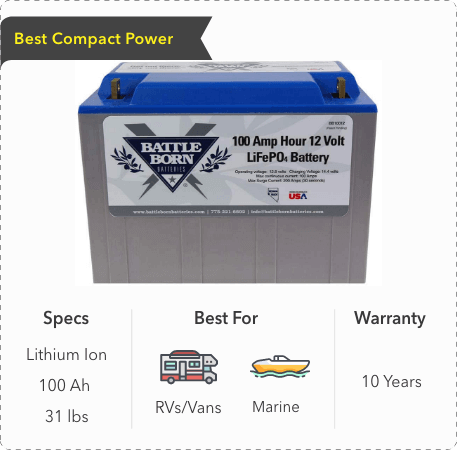
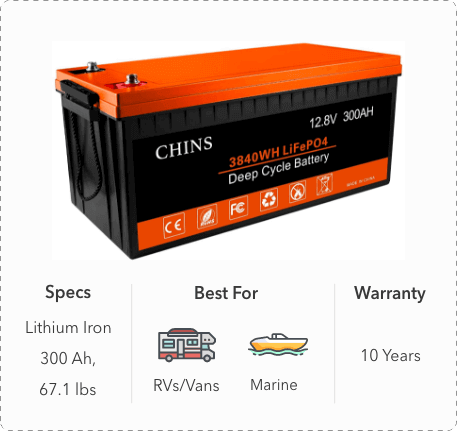
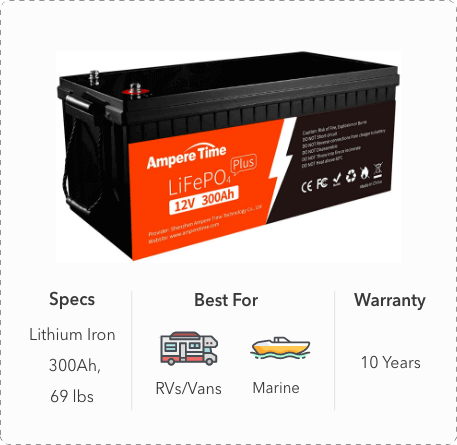
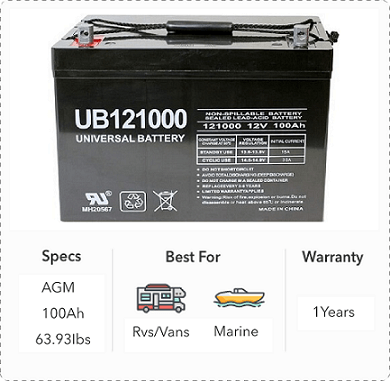
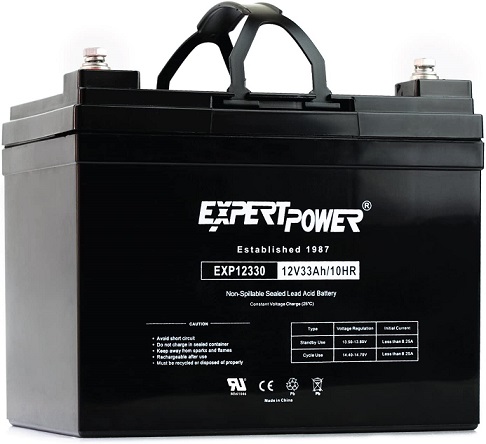
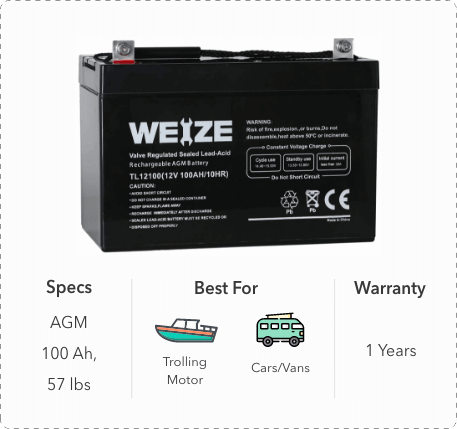
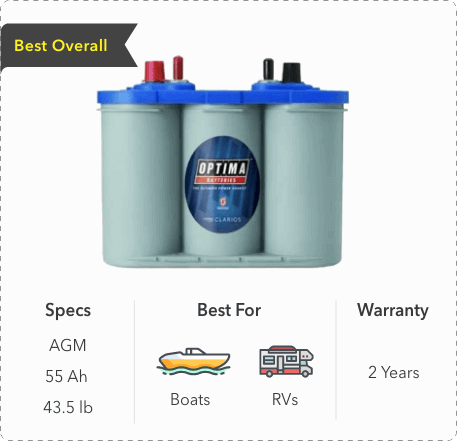

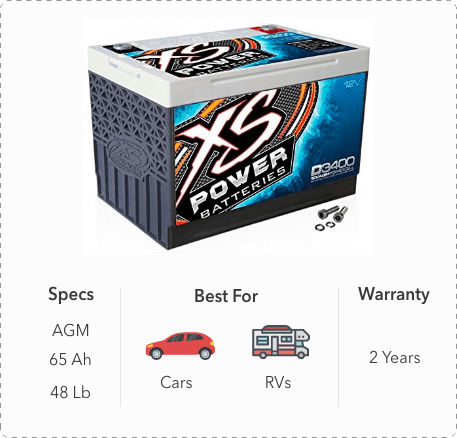
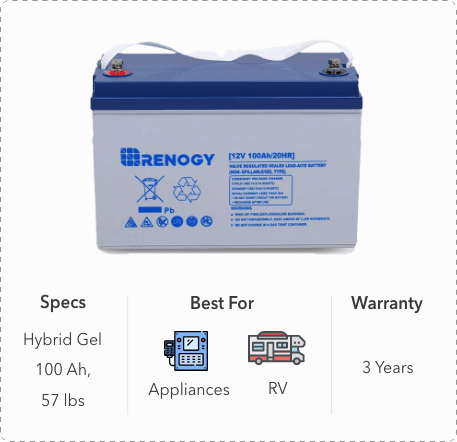


![]()